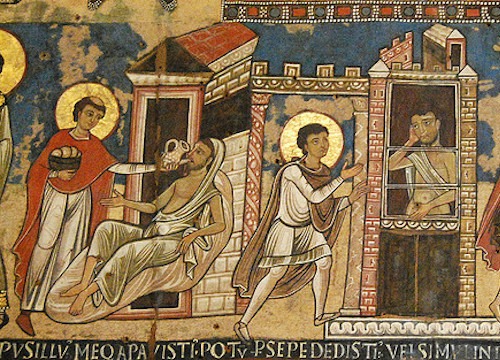We run our website the way we wished the whole internet worked: we provide high quality original content with no ads. We are funded solely by your direct support. Please consider supporting this project.

The Call to a Cruciform Life
Jesus repeatedly taught that following him meant that one had to be willing to “pick up their cross daily and follow [him]” (Lk 9:23; 14:27). Picking up our cross is the centerpiece of following Jesus because this was the centerpiece of what Jesus was all about. The thematic centrality of the cross is also illustrated in Jesus’ teaching that to be considered a “child of your Father in heaven,” one has to be willing to refuse to retaliate and instead “love your enemies and pray for those who persecute you” (Mt 5:44-5, cf., 38; Lk 6:27-35), for this is precisely the example that Jesus set when he refused to use his power to defend himself, choosing instead to die for his enemies rather than to crush them (Mt 26:51-3).
Along the same line, the cross is the thematic center of all of Jesus’ teachings that speak of the need for people to lose their life in order to find it (Mt 10:39; 16:25) and that associate greatness with humility, innocence and serving others (e.g., Mt 16:11-4; 23:11-2; Lk 18:15-7). In addition, Jesus takes the common understanding of power and turns it on its head by associating it with a willingness to sacrificially serve others (e.g., Mt 20:20-8).
The cross was not merely something God did for us; it was also an example God calls disciples to follow. It is thus significant that after defining the kind of love that characterizes God by pointing us to Jesus’ death on the cross, John immediately goes on to add: “And we ought to lay down our lives for one another“ (1 Jn 3:16, emphasis added). This and a number of similar passages make it evident that God’s will is for the cruciform love that defines his own, eternal, triune nature to transform us and flow through us to others.
In yesterday’s post, I briefly introduced Augustine’s subjective definition of love that enabled him, and multitudes of others that followed him, to claim that for God as well as God’s people, loving enemies does not necessarily rule out torturing and killing them. This definition is explicitly ruled out by the teachings of Jesus and Paul. Jesus commanded us not merely to love our enemies as an inner disposition, but to express this love by how we actually treat them. The love that Jesus teaches and models is both active and nonviolent.
We are specifically instructed to “bless,” “pray for,” “do good” to, “be merciful” toward, and to “lend to” our enemies “without expecting to get anything back” (Mt 5:44-45, Lk 6:28-29, 35). These are not inner dispositions: they are concrete behaviors! So too, we are taught to disobey the OT’s command to exact just retribution and to instead “not resist (antistemi) an evil doer” and to turn the other check when struck (Mt 5:38-9). These are obviously not merely instructions about how we should think or feel in response to enemies: they are instructions on how we are to actually behave in response to the hostile behavior of enemies!
The same holds true when Paul instructs us to “[b]less”—“not curse”—those who persecute us (Rom 12:14), and to never “repay evil for evil” (Rom 12:17). Specific behaviors are also implied when Paul instructs us to never “exact revenge” (12:19), but to instead “overcome evil with good” (12:21) by feeding enemies when they’re hungry and offering them something to drink when they are thirsty, for example (Rom 12:20). All of these passages expose the artificiality of Augustine’s fateful attempt to divorce the love we are commanded to live in from the commitment to non-violence that is entailed by this love.
There is not one exception clause to any of the NT’s instructions about loving enemies and, therefore, the refusal to resort to violence in response to them. To the contrary, the unqualified way Jesus speaks about enemies makes it clear that it includes every possible enemy who is threatening us for any possible reason. Moreover, far from allowing for “justified” exceptions, Jesus explicitly rules out any possible exceptions when he emphasized in as strong as terms as possible that his followers were to love indiscriminately—the way God loves and blesses the just and unjust by causing his sun to shine and his rain to fall on everyone, without any regard to whether the people we are called to love deserve it or not (Mt 5:45; Lk 6:35). The sun and rain do not pick and choose whom they will and will not fall on. Rather, the sun shines and the rain falls simply because it’s the sun’s nature to shine and it’s the nature of rain to fall.
Category: General
Tags: Cruciform Theology, Enemy Love, Kingdom Living
Topics: Following Jesus
Related Reading

The Key to Understanding the Bible
In yesterday’s post we discussed how Jesus is the starting point for interpreting Scripture. If this is the case and Jesus is the subject matter of all Scripture, then the ultimate challenge is to disclose how each aspect of Scripture bears witness to his subject. To state it otherwise, if the intended function of all Scripture is to mediate…

The Kingdom of God While Mowing the Lawn
The Kingdom of God is first and foremost characterized by the kind of love Jesus demonstrated on Calvary and throughout his life. Everything we do, Paul says, is to be done in love (1 Cor. 16:14). Love is the only thing that ultimately matters (Gal. 5:6; cf. I Cor. 13:1-3). As our lives become a…

Divine Accommodation and the Cross: where Calvin was onto something
Over the last few posts, I’ve been arguing that the cross represents the thematic center of everything Jesus was about. Hence, rather than striving to have a “Christocentric” theology — which is so broad it means next to nothing—we ought to sharpen our focus by striving for a “cruciform” theology. I then offered some suggestions…

The Entire Old Testament is About Jesus
Jesus himself taught that he carried more authority than any prophet that predated him. Though Jesus regarded John as the greatest prophet up to himself (Matt 11:11), he claimed his own “testimony” was “weightier (megas) than that of John” (Jn. 5:36). Jesus certainly wasn’t denying John or any previous true prophet was divinely inspired. But…

Loving Enemies in the Day of ISIS
The following excerpt from Myth of a Christian Religion discusses Jesus’ command to “turn the other cheek.” Whatever our response to the persecution of Christians in the world, we must take this passage seriously. While this excerpt does not tell us exactly how to respond, it can be used to shape our attitude and stance…

Memorial Day
For Memorial Day, we thought we would repost Greg’s thoughts from 2007. In this post, Greg expresses his conflicted feelings over this holiday and gives a brief defense of Christian pacifism. *** Hope you all had a happy Memorial Day. (Isn’t that something of a misnomer — a happy time remembering people killed in war?) Memorial Day…
